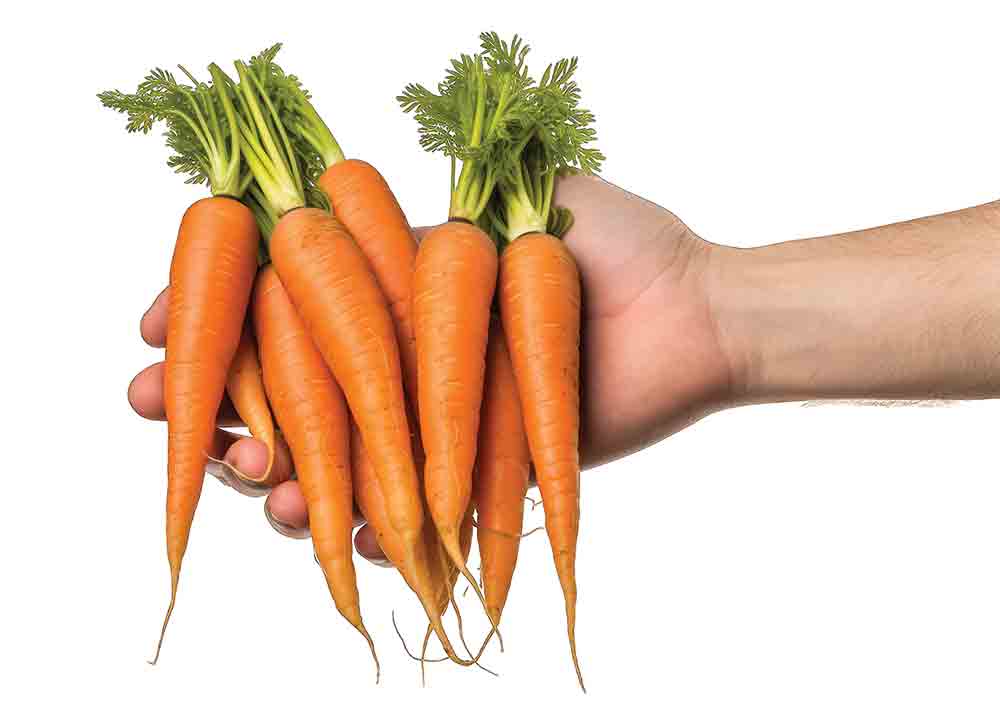Produce education made great strides in 2023

By Emily Banks Wooten
This email address is being protected from spambots. You need JavaScript enabled to view it.
(Editor’s Note: This is the first of a multi-part series exploring the variety of services offered by the Polk County Extension Office and Texas A&M AgriLife Extension Program and the impactful contributions made through these programs.)
Produce education was one of three major programs Polk County Extension Agent for Agriculture and Natural Resources Matthew March pursued during the 2023 calendar year.
The target audience for the program is commercial produce operations, small scale part time produce growers, home gardeners and Polk County senior citizens. Through the program, March partners and collaborates with Polk County Farm Bureau, growers’ breakfast volunteers, Livingston Farmers Market, Texas Department of Agriculture, Rudy’s Honey, Snook Farms and River V Growers.
“The majority of produce grown in Polk County is by part time produce growers, but the county also has three small scale produce operations and several blueberry orchards. Most of the produce grown in Polk County is sold at local farmers markets, with around 10% being marketed in Houston and Beaumont. Many of these growers have little to no access to knowledge and skills provided by industry and produce experts,” March said.
“The Polk County elderly population lacks access to fresh produce. This is due to pricing and availability, thus fresh produce is lacking from many seniors’ diets. The Polk County senior citizen community garden was started in the fall of 2021 to provide fresh produce for seniors at the senior center and for garden volunteers. The garden has continued to grow and provide produce to seniors attending the Polk County Senior Citizen Center,” he said.
March said that blueberries account for 49% of produce production by value. Vegetables such as tomatoes, squash, green beans and onions account for 40% of produce production by value. Other produce grown includes cow peas, blackberries, grapes, peaches and watermelons.
According to March, 19% of the Polk County population is over 65 years of age and 16.7% of the Polk County population lives below the poverty line. Portions of Polk County are considered a food desert by the USDA suggesting access to fresh produce is limited, especially for elderly citizens, he said.
Based on these statistics, the Texas A&M AgriLife Extension response was to develop programming to support the produce industry in Polk County by providing high quality education. Programming was relative for all types of produce growers, from home gardeners to commercial operations.
“Polk County Produce Growers Breakfast Meeting was the cornerstone of programming for produce growers in the county. The meeting made available specialists, industry experts and knowledge of local producers to enhance the production and economic sustainability of growers that attended. The growers meeting fostered a co-op style of learning among participants to learn from each other’s successes and failures. The highlight of the year was a county farm tour in May. During the tour, participants observed a tomato variety result demonstration conducted by a grower collaborator,” March said.
Some of the topics addressed through the produce growers breakfast meetings were beekeeping, marketing, fruit tree selection, preserving the harvest, county farm tour and insect control.
“We continued to support and coordinate volunteers for the senior citizen community garden. Produce is provided to the senior citizen center to enhance the diet and provide nutritional food to local seniors. We partnered with the Polk County health agent to host senior citizen center lunch and learn series to share healthy recipes and increase knowledge of produce production,” March said.
Some of the produce grown, studied, prepared and eaten included avocados, nuts and seeds, bok choy, kohlrabi, turnips, kale, olives, cucumbers and sunflowers.
March said that retrospective post surveys were utilized after programs to measure knowledge gained, intentions to adopt recommended practices and economic impact. He added that participant comments were used to determine effectiveness of the programs.
Fourteen of 14 participants, or 100%, completed the produce growers breakfast end of year survey. One hundred percent of respondents said they attend the growers breakfast meetings to increase their knowledge; 93% said they anticipate an economic benefit; and 71% said that economic benefit can be attributed to improved product or product quality.
Fifteen of 23 participants, or 65%, completed the county farm tour survey. One hundred percent of respondents said they increased their knowledge on how to grow produce in East Texas; 100% said they plan to adopt at least one production technique observed on the county farm tour in their own garden; and 93% said they anticipate an economic benefit in their own produce operation or garden.
Twenty-four of 24 participants, or 100%, completed the senior citizen lunch and learn end of year survey. Ninety-six percent of respondents said they have added more fresh produce (fruits, vegetables, herbs, nuts and/or seeds) to their diet; 92% said they have increased their knowledge about nutritional value of fresh produce and cooking with fresh produce; 88% said they increased their knowledge about how produce is grown; and 88% said they have added at least one new fruit, vegetable, herb, nut or seed to their diet.
Regarding the senior citizen community garden, March said that five volunteers contributed 100 hours during 2023 and that 2,173 individual pieces of produce were provided to senior citizens. Three hundred eighty pounds of produce were harvested, providing 1,216 servings and 109,440 calories.
In closing, March said the anticipated economic impact from participants attending the produce growers breakfast meeting is $5,150. As for future programming, he said he will continue to conduct tomato variety result demonstrations along with other crops to demonstrate which varieties grow best in Polk County.
For additional information, contact March at 936-327-6828 or at This email address is being protected from spambots. You need JavaScript enabled to view it..
You are a guest
or post as a guest
Be the first to comment.

